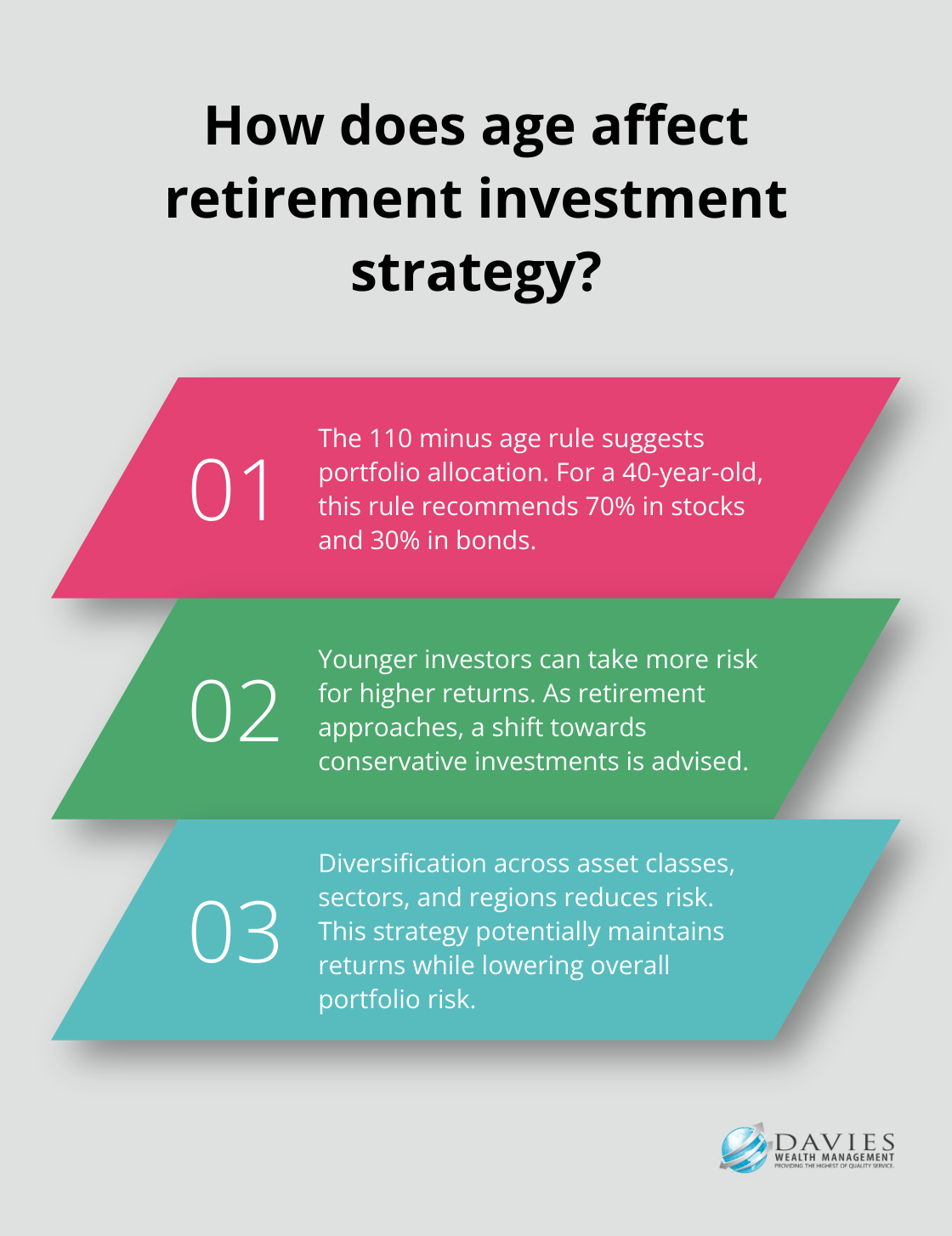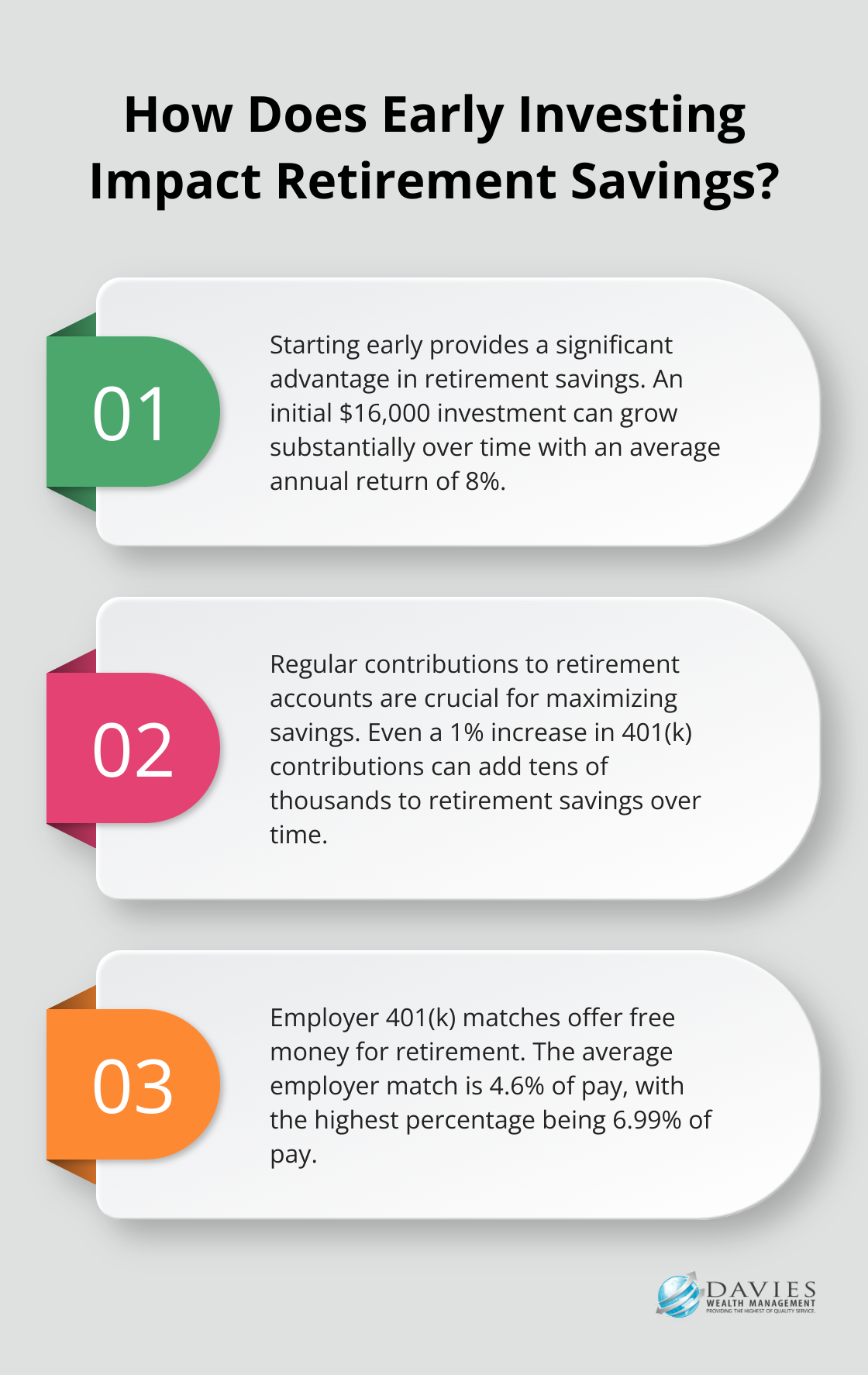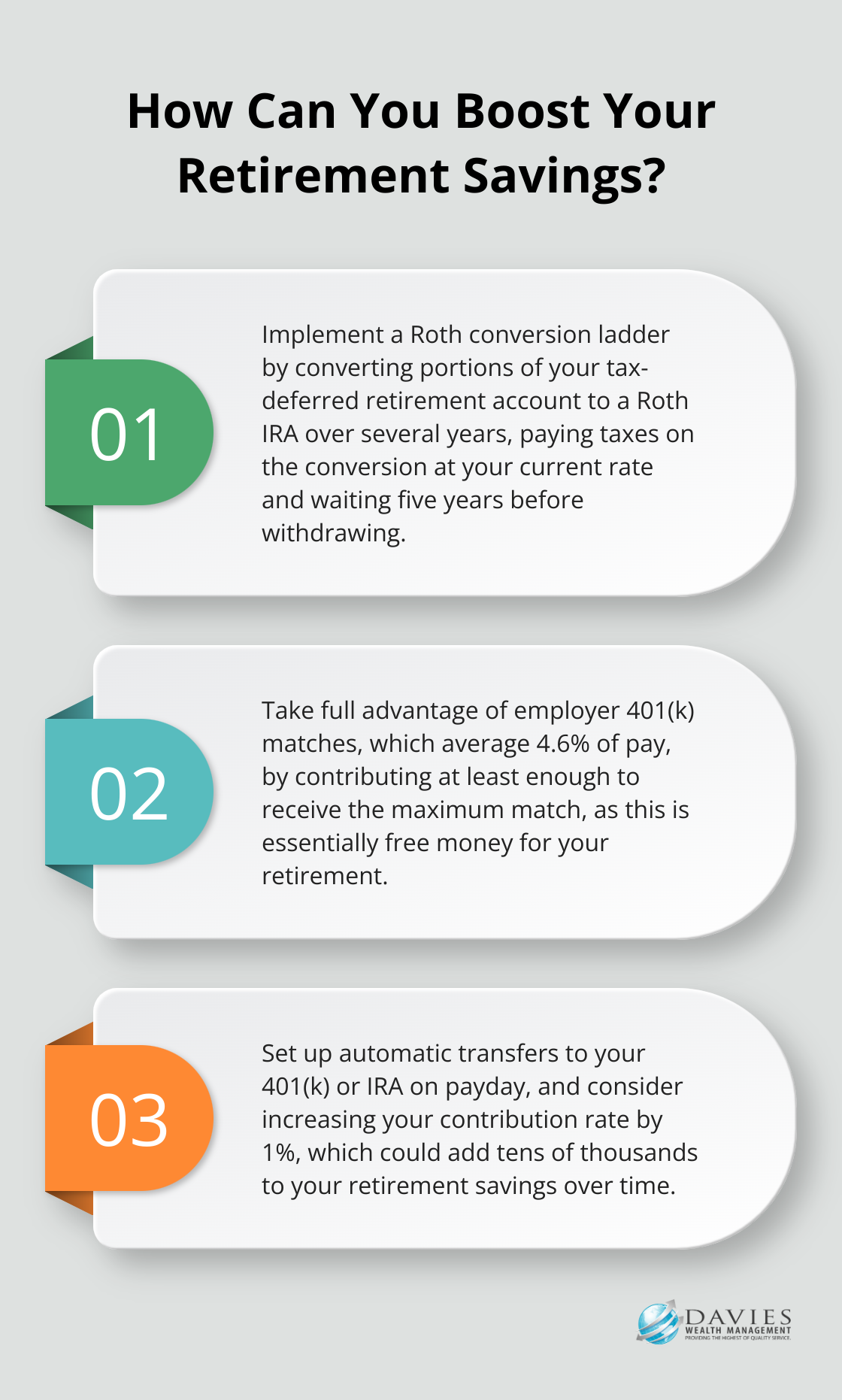Securing a comfortable retirement is a top priority for many individuals, yet the path to financial security can be complex. At Davies Wealth Management, we understand the importance of smart investment strategies tailored to your unique retirement goals.
Our investment advice for retirees focuses on balancing risk and reward while maximizing long-term growth potential. This blog post will guide you through essential retirement investment strategies, helping you make informed decisions for a financially stable future.
How to Build a Robust Retirement Investment Strategy
The Power of Starting Early
Time is your greatest ally in retirement investing. The earlier you start, the more you benefit from compound interest. Determine how much your money can grow using the power of compound interest.
Balancing Risk and Reward
Your investment strategy should evolve as you progress through different life stages. In your younger years, you can take on more risk for potentially higher returns. As you approach retirement, you should shift towards more conservative investments to protect your wealth.

A common guideline suggests subtracting your age from 110 to determine the percentage of your portfolio that should be in stocks. For example, if you’re 40, you might aim for 70% in stocks and 30% in bonds. However, this is just a starting point – your individual risk tolerance and financial goals should always guide your decisions.
The Essential Role of Diversification
Diversification is a cornerstone of any robust investment strategy. You can potentially reduce risk without sacrificing returns by spreading your investments across various asset classes, sectors, and geographic regions.
Tailoring Your Strategy
Every individual’s financial journey is unique. Your retirement investment strategy should reflect your personal goals, risk tolerance, and life circumstances. Some factors to consider include:
- Your current age and expected retirement age
- Your income and savings rate
- Your desired lifestyle in retirement
- Your health and life expectancy
- Your other sources of retirement income (e.g., pensions, Social Security)
Adapting to Market Changes
The financial markets are dynamic, and your investment strategy should be flexible enough to adapt to changing conditions. This doesn’t mean making drastic changes based on short-term market fluctuations. Instead, you should periodically review and rebalance your portfolio to ensure it aligns with your long-term goals.
As we move forward, let’s explore the various types of retirement investments that can form the building blocks of your personalized strategy.
What Are the Best Retirement Investment Options?
Retirement investing requires a tailored approach. Let’s explore some of the most effective retirement investment vehicles.
Individual Retirement Accounts (IRAs)
IRAs stand out as popular retirement savings tools. Traditional IRAs offer tax-deductible contributions and tax-deferred growth, while Roth IRAs provide tax-free withdrawals in retirement. In 2025, you can contribute up to $7,000 annually to an IRA.
Employer-Sponsored Retirement Plans
401(k)s, 403(b)s, and similar plans serve as powerful wealth-building tools. These plans often come with employer matching (essentially free money for your retirement). For 2025, the contribution limit for 401(k)s is $23,500, with an additional $11,250 catch-up contribution for those 50 and older.
Stocks, Bonds, and Mutual Funds
These traditional investment vehicles form the backbone of many retirement portfolios. Stocks offer growth potential but come with higher risk. Bonds provide stability and income, while mutual funds offer diversification and professional management. A Vanguard study shows that a portfolio of 60% stocks and 40% bonds has provided an average annual return of about 8.8% from 1926 to 2022.
Real Estate Investment Trusts (REITs)
REITs allow you to invest in real estate without directly owning property. They often provide steady income through dividends and potential for capital appreciation. The National Association of Real Estate Investment Trusts (NAREIT) reports that REITs have outperformed the broader markets in 2025, with the FTSE Nareit All Equity REITs Index yielding 12.27%, compared to 1.30% for the S&P 500.
Annuities
Annuities can provide a guaranteed income stream in retirement. While they can be complex, certain types of annuities can prove valuable for those seeking predictable income. A study by LIMRA found that 73% of annuity owners feel more confident about affording their preferred retirement lifestyle.

Creating a personalized retirement investment strategy involves considering factors like your risk tolerance, time horizon, and specific goals to determine the right mix of these investment options. Professional athletes, in particular, face unique financial situations that require specialized expertise to secure their long-term financial future.
As we move forward, let’s explore how to maximize your retirement savings through smart strategies and consistent action.
How to Maximize Your Retirement Savings
The Power of Early Investing
Starting early provides a significant advantage in retirement savings. Compound interest transforms modest savings into substantial wealth over time. For example, at an average annual return of 8%, an investor would only need an initial $16,000 to see significant growth over time.
Consistent Contributions Matter
Regular contributions to your retirement accounts play a vital role. Set up automatic transfers to your 401(k) or IRA on payday. This “pay yourself first” approach ensures you invest consistently before spending the money elsewhere. Even small increases in your contribution rate can make a big difference. A 1% boost in your 401(k) contribution could add tens of thousands to your retirement savings over time.
Leverage Employer Matches
Take full advantage of employer 401(k) matches. This is essentially free money for your retirement. According to Vanguard’s annual report on investing behavior, the average match by employers was 4.6% of pay, with the highest percentage being 6.99% of pay.
Adapt Your Strategy with Age
As you near retirement, it’s important to shift your investment strategy. The traditional advice of subtracting your age from 110 to determine your stock allocation serves as a good starting point, but it’s not one-size-fits-all. A personalized investment strategy should account for your unique circumstances, risk tolerance, and retirement goals.
Implement Tax-Efficient Withdrawal Strategies
Your withdrawal strategy can significantly impact your tax bill and the longevity of your nest egg. Consider a mix of traditional and Roth accounts to give yourself tax flexibility in retirement. You might use taxable accounts or Roth IRA withdrawals in high-income years to avoid pushing yourself into a higher tax bracket.
The Roth conversion ladder offers another strategy to consider. This involves converting portions of your tax-deferred retirement account to a Roth IRA over several years, paying taxes on the conversion at your current rate. The process includes three key steps: 1) Convert a portion of your tax-deferred retirement account to a Roth IRA, 2) Mind the five-year waiting period, and 3) Repeat the process annually.

For high-income earners, including professional athletes, the backdoor Roth IRA strategy can effectively contribute to a Roth IRA despite income limitations. This involves making a non-deductible contribution to a traditional IRA and then immediately converting it to a Roth IRA.
Final Thoughts
Smart investments play a key role in securing a comfortable retirement. You can build a robust foundation for your financial future through early planning, risk management, and portfolio diversification. Various retirement investment options, including IRAs, 401(k)s, stocks, bonds, and REITs, offer opportunities to grow your wealth over time.

A comprehensive retirement strategy involves more than selecting the right investments. It requires consistent contributions, leveraging employer matches, and adapting your approach as retirement nears. Tax-efficient withdrawal strategies also help preserve your wealth during retirement years.
Your unique circumstances should shape your investment strategy. At Davies Wealth Management, we provide tailored investment advice for retirees and those planning for retirement. Our team offers comprehensive financial planning, including investment management, retirement planning, and tax-efficient strategies to help you achieve your retirement goals.



Leave a Reply